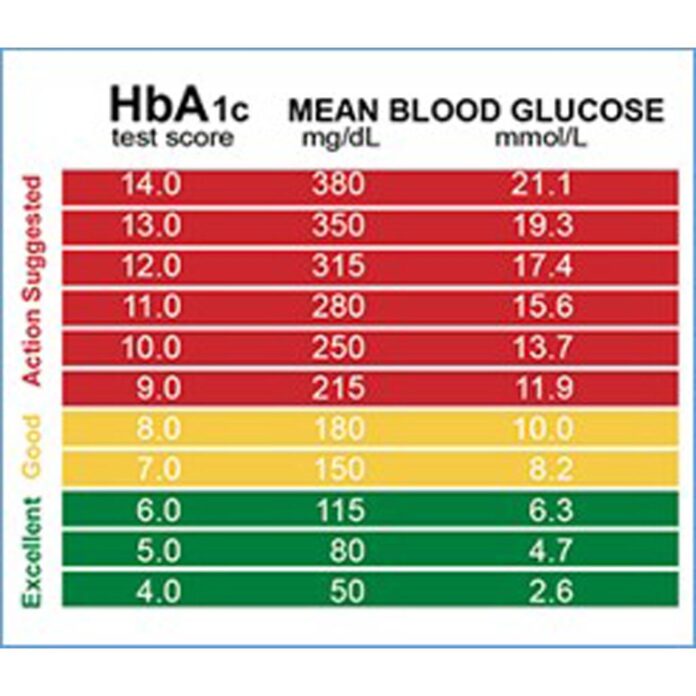
Diabetes is a chronic condition that affects millions of people worldwide. It occurs when the body is unable to regulate blood sugar levels properly, leading to high levels of glucose in the bloodstream. Managing diabetes requires careful monitoring of blood sugar levels and following a treatment plan prescribed by a healthcare provider. One important tool in managing diabetes is monitoring HbA1c levels.
What is HbA1c?
HbA1c, or hemoglobin A1c, is a test that measures the average blood sugar levels over the past two to three months. It is a crucial tool for healthcare providers to determine how well a person’s diabetes is being managed. The test measures the percentage of hemoglobin that is glycated, or attached to glucose molecules. The higher the percentage, the higher the average blood sugar levels have been over the past few months.
Why is HbA1c important in diabetes management?
Monitoring HbA1c levels is important for several reasons. Firstly, it provides valuable information about how well a person’s diabetes is being managed. A high HbA1c level indicates that blood sugar levels have been consistently elevated over the past few months, which can increase the risk of long-term complications such as heart disease, kidney disease, and nerve damage. On the other hand, a low HbA1c level indicates that blood sugar levels have been well controlled, reducing the risk of complications.
Secondly, HbA1c levels can help healthcare providers adjust treatment plans. If a person’s HbA1c levels are consistently high, changes may need to be made to their medication, diet, or exercise routine to improve blood sugar control. Conversely, if HbA1c levels are consistently low, adjustments may need to be made to prevent hypoglycemia, or low blood sugar levels.
Furthermore, monitoring HbA1c levels can help motivate people with diabetes to make healthy lifestyle choices. Seeing the impact of diet, exercise, and medication on HbA1c levels can provide encouragement to continue making positive changes to manage diabetes effectively.
How often should HbA1c levels be checked?
The frequency of HbA1c testing depends on the individual and their diabetes management plan. In general, HbA1c levels should be checked at least twice a year for people with stable blood sugar control. However, for those who are struggling to control their diabetes or have recently changed their treatment plan, more frequent testing may be necessary. Healthcare providers will determine the appropriate testing schedule based on the individual’s needs.
What is a target HbA1c level?
The target HbA1c level for people with diabetes varies depending on their age, overall health, and risk of complications. In general, a target HbA1c level of below 7% is recommended for most adults with diabetes. However, for older adults or those at higher risk of complications, a slightly higher target may be appropriate to avoid the risk of hypoglycemia. It is important for individuals to work closely with their healthcare provider to establish a target HbA1c level that is right for them.
How can HbA1c levels be lowered?
There are several ways to lower HbA1c levels and improve blood sugar control. One of the most important factors is following a healthy diet that is low in sugar, fat, and processed foods. Eating a balanced diet rich in fruits, vegetables, whole grains, and lean proteins can help stabilize blood sugar levels and lower HbA1c.
Regular exercise is also important for managing diabetes and lowering HbA1c levels. Physical activity helps the body use insulin more efficiently, reducing blood sugar levels and improving overall health. Aim for at least 150 minutes of moderate-intensity exercise per week, such as brisk walking, cycling, or swimming.
Medication may be necessary for some people to lower HbA1c levels. Oral medications or insulin injections can help regulate blood sugar levels and prevent complications. It is important to take medication as prescribed by a healthcare provider and monitor blood sugar levels regularly to ensure they are well controlled.
In conclusion, monitoring HbA1c levels is a crucial aspect of managing diabetes effectively. By understanding the importance of HbA1c levels and working closely with healthcare providers to establish target levels and a treatment plan, individuals with diabetes can reduce the risk of complications and lead a healthy, active life. By following a healthy diet, engaging in regular exercise, and taking medication as prescribed, it is possible to lower HbA1c levels and improve blood sugar control.
By prioritizing HbA1c testing and making positive lifestyle changes, individuals with diabetes can take control of their health and prevent the long-term complications associated with the condition. Talk to your healthcare provider today about the importance of HbA1c levels in diabetes management and how you can work together to achieve optimal blood sugar control.

















